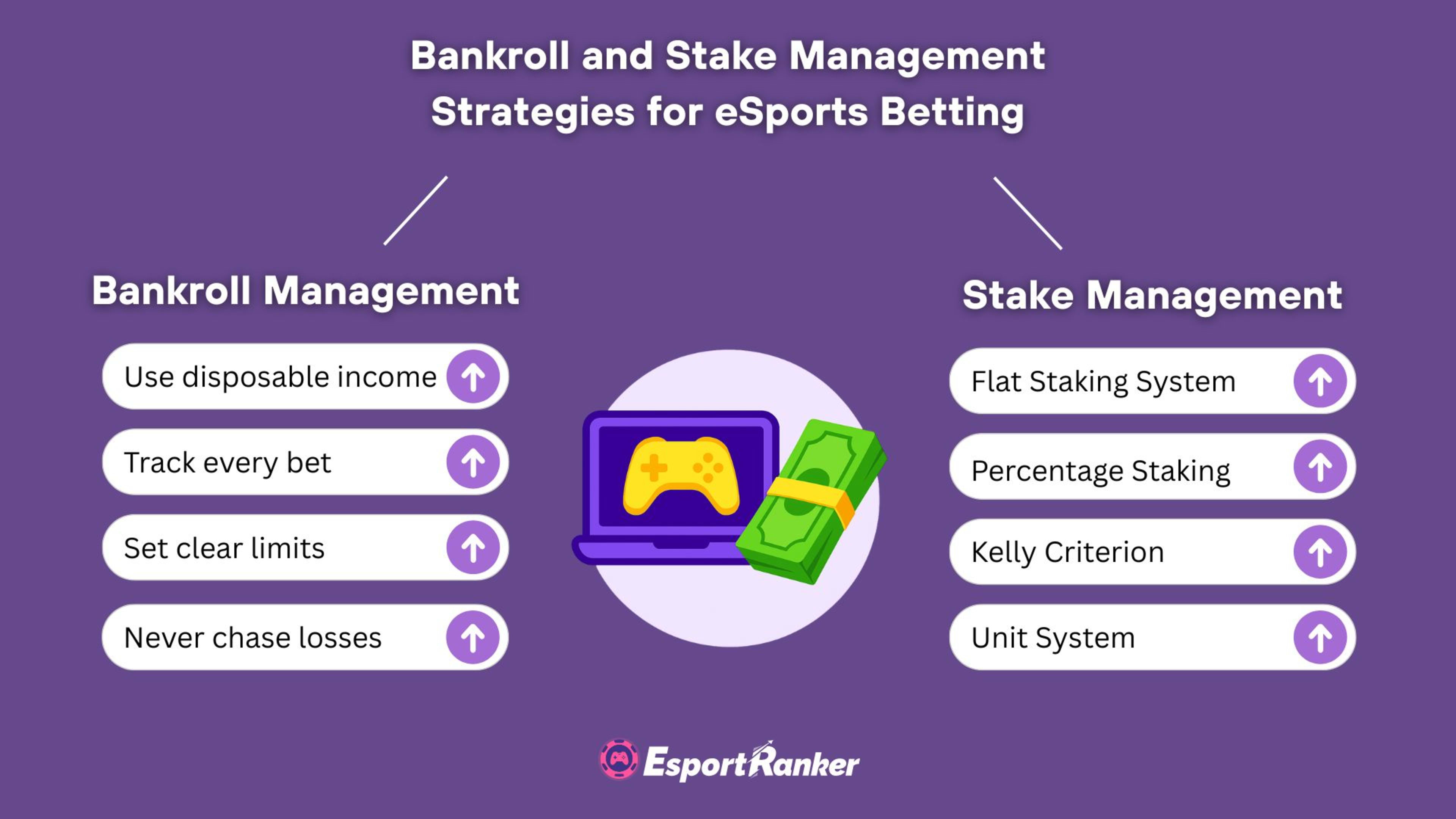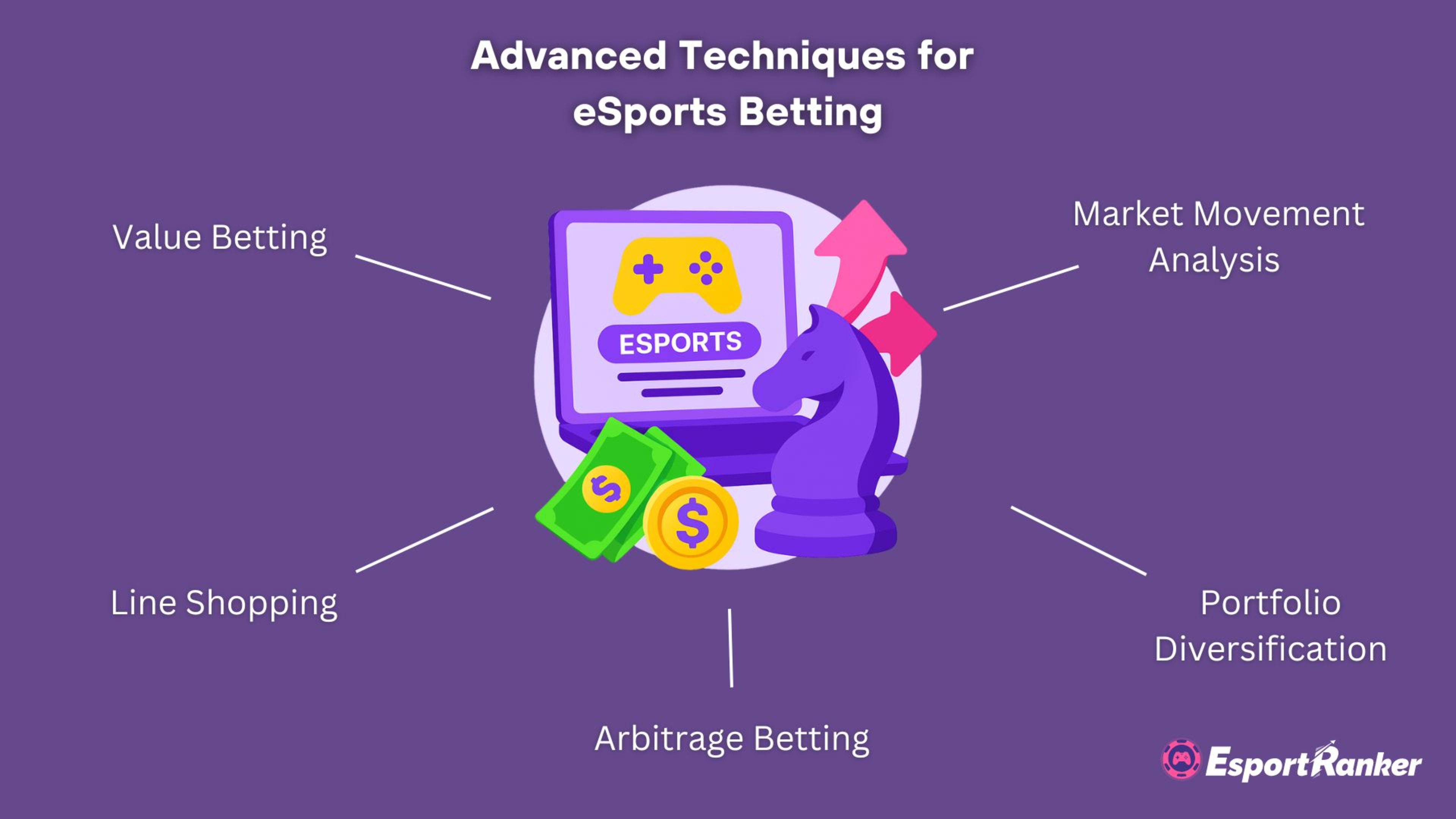Essential Strategies for Esports Betting: A Complete Overview
Esports betting has exploded in the UK, turning passionate fans into savvy bettors. Forget relying on luck; strategy is your winning hand. With rapidly evolving games, team shake-ups, and unique betting markets, standard sports betting tactics often fall short. A data-driven approach is crucial for consistent wins and minimizing risks.
At eSportsRanker, we decode the complexities of esports betting, offering clear, actionable strategies tailored for UK bettors. Our expert analysts track top games like Counter-Strike 2, League of Legends, Dota 2, and Valorant, spotting key trends in odds, performance, and bookmaker behaviour. This guide provides the insights you need to research, analyse, and confidently manage your bets across the esports arena.
Top-Rated eSports Bookmakers
What Research Should UK Players Conduct Before Placing an Esports Bet?
Successful esports betting for UK players begins long before you click “place bet.” Unlike traditional sports, esports games are shaped by fast patch cycles, shifting metas, and player or roster changes that can dramatically alter outcomes from week to week. Doing your homework isn’t optional — it’s what separates informed betting from pure guesswork.
The goal of research in esports betting is to identify true performance indicators that bookmakers may overlook. Understanding how these variables interact gives you a sharper edge and helps you recognize when the odds don’t accurately reflect reality.
Here’s what your pre-bet research should include:
- Team and Player Form: Check recent match results, individual player stats, and consistency over the last 5–10 games. A single upset doesn’t always mean a trend — look for patterns in team synergy and map preferences.
- Meta and Patch Changes: New updates can completely shift which heroes, weapons, or strategies are viable. For example, a League of Legends patch might nerf a champion central to a team’s strategy, or a CS2 map tweak might favour defensive teams.
- Head-to-Head Records: Some teams perform exceptionally well against specific rivals due to playstyle matchups. Historical data often reveals psychological and tactical edges that raw form data misses.
- Map or Game Mode Performance: Certain teams excel on specific maps (Mirage in CS2) or modes (Control in Overwatch*). Align your bets with these strengths.
- Tournament Context: Understand whether the match is part of group stages, playoffs, or qualifiers — motivation and risk tolerance vary by stage.
- Regional Strengths: Korean and Chinese teams often dominate MOBAs, while European and North American rosters lead in FPS titles. Factor regional skill gaps into your evaluation.
Pro Tip from eSportsRanker
Use reputable data sources such as HLTV.org (for Counter-Strike), Liquipedia, and LoL Esports Stats to cross-check match history, patch updates, and player metrics. These sources ensure your decisions are based on verified, real-time information, not assumptions or fan opinions.
Good research transforms esports betting from a game of chance into a calculated, data-informed discipline — and that’s exactly the mindset UK bettors should apply.
How Can UK Players Use Data and Analytics to Find Value in Esports Odds?
Esports betting is one of the most data-rich environments in all of online wagering. Every kill, map, and ability cast produces measurable statistics — and that data, when analysed properly, can reveal value bets that bookmakers overlook. Understanding how to interpret esports data helps you move from reactive betting (following odds trends) to proactive betting (identifying mispriced opportunities).
What Is Value Betting in Esports?
Value betting is the process of spotting bets where the true probability of an outcome is higher than what the odds imply. For example, if your analysis suggests that Team Vitality has a 60% chance to win, but the bookmaker’s odds reflect only a 50% probability, that’s a value opportunity. Mathematically:
Expected Value (EV) = (True Probability × Payout) – (1 – True Probability)
When EV is positive, you’re placing a statistically favourable bet — the foundation of professional-level betting.
According to Esports Insider, understanding the context behind odds — such as player performance metrics and map-based efficiencies — is critical for identifying consistent value bets rather than relying solely on intuition.
Key Metrics to Analyse Before Betting
To apply data analytics effectively, focus on variables that genuinely impact outcomes rather than surface-level stats.
- Win Rate by Map or Mode: Use sources like HLTV.org or Liquipedia.net to track how teams perform across different maps. A team with a 75% win rate on Inferno but only 30% on Ancient offers clear betting signals.
- First Objective Success Rate: For games like League of Legends or Dota 2, securing the first Dragon, Baron, or Tower is often predictive of the final result.
- Kill-Death Ratio (K/D) Trends: Player-level stats, especially for entry fraggers or mid-laners, can indicate early-round momentum.
- Consistency Over Time: A spike in recent performance might reflect an unsustainable streak — balance short-term form with long-term averages.
- Market Movement History: Track how odds shift over time with tools like OddsPortal. Sudden line movement without public news may signal insider or data-driven betting activity.
Example of Applying Analytics to a Real Esports Match
Suppose you’re evaluating NAVI vs. FaZe Clan in a Counter-Strike 2 best-of-three:
- NAVI’s win rate on Mirage: 70% (past 6 months)
- FaZe’s win rate on Mirage: 48%
- NAVI’s pistol round conversion rate: 65% (industry average ~52%)
If the bookmaker lists both teams at even odds (2.00 each), the data suggests NAVI is undervalued — a clear value bet opportunity.
Recommended Tools and Resources for UK Bettors
To apply esports data analytics effectively, rely on platforms trusted by the betting and analytics community:
- HLTV.org – Comprehensive stats for CS2 matches and players.
- Oracle’s Elixir – Advanced League of Legends analytics, including team economy and objective control.
- Esports Charts – Tournament data and audience insights that help track team momentum.
- BetBurger – Scans bookmaker odds to find arbitrage and value bet opportunities.
Takeaway for UK Esports Bettors
Modern esports betting strategies are no longer driven by guesswork — they’re built on real-time data correlation and contextual analytics. By combining statistical rigour with game-specific knowledge, bettors can uncover inefficiencies in odds markets that general bettors miss.
In short, the smartest esports bettors don’t predict outcomes — they calculate probabilities. And those calculations are what separate informed strategy from speculation.
What Bankroll and Stake Management Methods Work for UK Esports Bettors?

Even the most data-driven strategy will fail without disciplined bankroll management. In esports betting — where matches occur daily and odds fluctuate rapidly — managing your money with structure is what keeps you profitable in the long term. The goal isn’t to win every bet, but to protect your capital and ensure consistent performance over time.
Proper staking and bankroll allocation are fundamental to sustainable betting — especially in esports, where volatility and momentum can lead to emotional decision-making.
What Is a Bankroll in Esports Betting?
Your bankroll is the total amount of money you’ve set aside specifically for betting — completely separate from personal finances. Think of it as your “operating capital” for strategic wagering.
To build a healthy bankroll system:
- Only use disposable income — money you can afford to lose.
- Track every bet in a spreadsheet or app like Betscore or BetBurger Tracker.
- Set clear limits: how much to stake per bet, per day, and per tournament.
Stake Management Strategies That Work
Stake management determines how much of your bankroll you risk on each bet. Here are the most effective systems used by professional esports bettors:
- Flat Staking System
- Bet the same amount (e.g., 1–2% of bankroll) on every wager, regardless of confidence level.
- Best for beginners who want stability and clear tracking.
- Example: With a $1,000 bankroll, bet $10–$20 per match.
- Percentage Staking System
- Stake a fixed percentage of your current bankroll, not a fixed dollar amount.
- This method adjusts automatically as your bankroll grows or shrinks, maintaining consistent risk.
- Commonly used percentages: 1–3% per bet.
- Kelly Criterion (Advanced)
- A mathematical formula used to maximize expected growth while minimizing ruin risk.
- Formula: Stake = (bp – q) / b, where b = decimal odds – 1, p = probability of winning, q = 1 – p.
- Recommended for advanced bettors who use data models to determine true win probabilities.
- More info: Kelly Criterion
- Unit System
- Define 1 “unit” as a percentage of your bankroll (e.g., 1% = 1 unit).
- Use variable units depending on confidence — for example, 1 unit for standard bets, 2–3 units for high-confidence opportunities.
Smart Bankroll Management Habits
- Never chase losses: Losing streaks are inevitable — doubling stakes rarely ends well.
- Avoid overexposure: Don’t place multiple bets on the same match (e.g., match winner, total kills, and map winner).
- Set stop-loss and stop-win limits: Decide in advance when to stop betting for the day.
- Diversify across esports titles: Don’t risk your entire bankroll on one game; mix CS2, LoL, and Dota 2 events.
- Reinvest profits strategically: Only reinvest a percentage of your winnings; withdraw regularly to stay grounded.
Example of Bankroll Management in Practice
Let’s say your esports betting bankroll is $500:
- You decide on a 2% flat stake = $10 per bet.
- You place 10 bets per week = $100 total risk exposure.
- Even with a 55% win rate and average odds of 1.90, your expected return over 100 bets is ~$95 profit — with low volatility and no risk of ruin.
When Should You Bet Live or In-Play in Esports?
Live, or in-play betting, is one of the fastest-growing areas in esports wagering — and for good reason. With matches featuring dynamic momentum swings, player substitutions, and objective-based gameplay, live betting offers bettors the chance to capitalize on real-time developments that pre-match odds can’t anticipate.
Live esports betting gives an analytical edge to those who can interpret gameplay context faster than the bookmaker’s automated models. But while the rewards can be significant, the risks are equally real: markets change within seconds, and hesitation can turn potential profit into a missed opportunity.
Why Live Betting Matters in Esports
Live betting allows you to adapt as matches evolve — giving you access to:
- Momentum trading: Identifying when a team is mounting a comeback or losing coordination.
- Market inefficiencies: Exploiting delay gaps in bookmakers’ live data feeds.
- Reduced uncertainty: Using early-game performance indicators before committing to long-term outcomes.
In titles like Counter-Strike 2 or League of Legends, where early rounds or objectives often determine overall direction, reacting in real-time can uncover value that pre-match bettors never see.
Live vs. Pre-Match Betting: Key Differences
| Feature | Pre-Match Betting | Live/In-Play Betting |
|---|---|---|
| Information Level | Based on pre-game analysis | Includes real-time performance data |
| Reaction Time | Calm, methodical decisions | Fast decisions within seconds |
| Market Stability | Odds move slowly | Odds change every play or round |
| Risk Profile | Lower volatility | Higher volatility but more opportunities |
| Best For | Long-term value bettors | Experienced players who can multitask and react quickly |
How Should You Choose Esports Markets That Fit Your Strategy?
Choosing the right esports betting markets isn’t about chasing excitement — it’s about aligning your strategy with the type of wagers that complement your knowledge, data confidence, and risk tolerance. Every esports title offers different betting structures, and each market carries a distinct balance of volatility, predictability, and reward.
Primary Esports Betting Markets
- Match Winner (Moneyline):
The simplest and most popular market — betting on which team will win the match. Ideal for beginners or those relying on long-term performance data.
Best for: Consistent teams and structured tournaments. - Map or Round Winner:
Common in CS2 and Valorant, this market allows betting on individual map results. It’s ideal for bettors who specialize in map-based analytics.
Best for: Bettors analyzing map pool strengths and veto patterns. - Handicap (Spread) Betting:
Adds balance when teams are unevenly matched — for example, betting on Team A (-1.5 maps) or Team B (+1.5 maps).
Best for: Risk-averse bettors looking to mitigate mismatched odds. - Total Maps or Rounds (Over/Under):
You bet whether a series or match will exceed a specific number of maps or rounds.
Best for: Predicting match length based on team playstyles (aggressive vs. defensive). - Prop and Special Bets:
Bets on micro-events — like first blood, first tower, or most kills.
Best for: Experienced bettors who follow in-game pacing closely. - Outright/Tournament Winner:
Long-term wagers on which team will win an entire tournament.
Best for: Strategic bettors using futures analysis and event bracket modeling.
Matching Market Type to Your Betting Strategy
| Strategy Type | Ideal Market(s) | Risk Level | Why It Works |
|---|---|---|---|
| Data-Driven Value Betting | Match Winner, Total Maps | Medium | Relies on historical data and performance trends |
| Momentum/Live Betting | Next Round, Map Winner | High | Takes advantage of in-game swings |
| Macro-Tournament Forecasting | Outright Winner, Group Stage Bets | Medium-High | Long-term exposure, potential for high returns |
| Player-Centric Analysis | Prop Bets, First Blood | High | Focused on individual performance metrics |
| Low-Variance Bankroll Building | Handicaps, Over/Under | Low-Medium | Safer returns through balanced markets |
Expert Insight from eSportsRanker
Every successful bettor develops a market identity — a specific niche they understand better than the average bookmaker. For instance:
- If you track League of Legends patch cycles and draft metas, prop bets on early objectives might be your edge.
- If you study Counter-Strike 2 map rotations and economy cycles, round handicaps or total rounds may offer more value.
The secret isn’t in betting on everything — it’s in mastering one or two market types that align with how you interpret data.
What Advanced Techniques Can Experienced Esports Bettors Use?

Once you’ve mastered the fundamentals — understanding odds, managing bankroll, and analyzing match data — the next step is applying advanced betting techniques. These strategies don’t rely on luck or fan intuition but on mathematical precision, predictive modeling, and market behavior. For serious esports bettors, using these techniques can improve long-term profitability and consistency.
Value Betting Through Probability Modeling
Advanced bettors use probability modeling to identify odds inefficiencies — situations where the bookmaker’s price misrepresents the real likelihood of an outcome.
- Build a model using historical data: map win rates, kill ratios, first-objective rates, or even team economy stability in CS2.
- Convert these into implied probabilities, then compare them to bookmaker odds.
- Bet only when your calculated probability exceeds the bookmaker’s (i.e., positive expected value).
Example: If your model gives Team Liquid a 65% chance to win but the bookmaker’s odds imply 55%, the bet carries long-term positive value.
Tools like BetBurger or SmartBet.io can automate the detection of such mismatches across esports markets.
Line Shopping and Market Arbitrage
Line shopping means comparing odds across multiple bookmakers to find the best price for the same event. Even a small difference (e.g., 2.00 vs. 2.10) compounds into higher profits over time.
- Maintain accounts with at least three reputable esports bookmakers (e.g., GG.Bet, Betway).
- Use tools like OddsPortal or BetBrain to track differences in real-time.
Some experienced bettors take this further with arbitrage betting, placing opposing bets on different platforms when the combined odds guarantee a small, risk-free profit.
Portfolio Diversification Across Games and Tournaments
Just as investors diversify portfolios, advanced bettors spread risk across multiple esports titles, regions, and tournament tiers.
- Diversify between FPS titles (CS2, Valorant) and MOBAs (LoL, Dota 2) to hedge against meta shifts or game-specific volatility.
- Focus on regional leagues (like LEC or NA CS2 circuits) where odds are less efficient compared to global Majors.
This approach reduces variance — losing in one market can be offset by gains in another.
Sentiment and Market Movement Analysis
Experienced bettors monitor odds movement patterns and community sentiment to anticipate where markets may shift before official adjustments.
- Follow esports discussion hubs like Reddit’s r/esportsbook and Liquipedia match pages for early roster leaks or meta changes.
- If odds move rapidly without public announcement, it often signals sharp money — professional or data-backed betting action.
Tracking and following these signals strategically can give you an early edge.
Conclusion
Whether you’re analyzing Counter-Strike 2 round-by-round stats, tracking League of Legends patch metas, or refining a Kelly-based staking model, the principles remain the same — strategy over instinct. Every professional bettor began as a learner who focused on consistency, not overnight wins.
If you’re ready to take your understanding further, explore our esports betting guides — a growing collection of expert resources that cover everything from esports odds and live betting strategies to tournament-specific insights and responsible wagering practices.
Related News
FAQ
What Are the Best Strategies for Esports Betting in the UK?
The best esports betting strategies combine thorough research, sensible bankroll management, and a disciplined approach. Successful bettors in the UK focus on consistent, long-term gains rather than chasing quick wins. They utilise resources like HLTV.org and Liquipedia.net to analyse teams, monitor odds fluctuations, and identify value bets where bookmaker odds don’t accurately reflect the true probabilities.
How Can I Find Value in Esports Odds?
Finding value in esports odds means spotting when a bookie has underestimated or overestimated a team or outcome. You can work this out using implied probability or betting calculators. For instance, if you reckon a team has a 60% chance of winning, but the odds suggest only 50%, that’s a value bet.
Is Live Betting in Esports Worth It?
Live betting in esports can be profitable if you're strategic. It lets you respond to changes in momentum, early-game advantages, or player substitutions that aren’t reflected in the pre-match odds. However, it demands quick thinking, minimal stream delay, and keeping your emotions in check.
What Is the Safest Way to Manage an Esports Betting Bankroll?
The safest way is to risk just 1–3% of your bankroll on each bet, using either a fixed-stake or percentage-based system. Tools like the Kelly Criterion can help you decide how much to stake while avoiding excessive risk. Always keep a record of every bet to ensure you're accountable and transparent with your betting.
Can Traditional Sports Betting Strategies Be Used for Esports?
Yes, but with some tweaks. Principles like value betting, staking plans, and diversification still apply, but esports has unique factors like game updates, meta shifts, and best-of-series formats. Your strategies need to consider these ever-changing conditions.
Which Esports Titles Are Best for Strategic Betting?
The most data-rich games – such as Counter-Strike 2, League of Legends, Dota 2, and Valorant – are great for strategic betting. They have frequent tournaments, consistent player stats, and active markets across many different bookmakers.
How Can I Avoid Common Mistakes in Esports Betting?
Don't bet based on emotions, chase losses, or rely solely on gut feeling. Instead, do structured research before each bet, track your performance, and only bet when the odds offer measurable value. Also, avoid low-tier tournaments where the data is unreliable, or the lineups are unpredictable.
Are There Tools to Help Me Improve My Esports Betting Strategy?
Yes – professional bettors in the UK often use:
- BetBurger for real-time odds scanning and arbitrage opportunities.
- OddsPortal for comparing odds across different bookmakers.
- Liquipedia for reliable information on events and teams.
These tools speed up your research, improve accuracy, and help you find any discrepancies between bookmakers.
Is Esports Betting Legal in the UK?
Yes, esports betting is legal in the UK, and it’s treated like traditional sports betting. Always make sure that the platform you’re using is licensed and regulated by the UK Gambling Commission. eSportsRanker only features bookmakers that comply with UK betting regulations.
Where Can I Learn More About Esports Betting Strategies?
You can find out more through eSportsRanker’s comprehensive betting guides. Our platform provides detailed resources on esports odds, live betting, tournament analysis, and responsible gambling practices – all supported by real data and expert insights.









